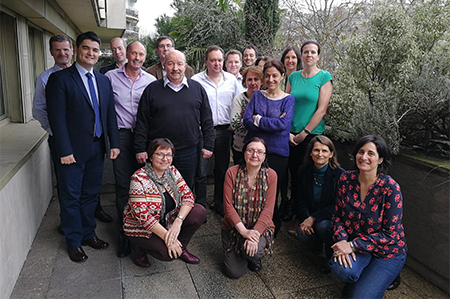
57th meeting of the Panel on Phytosanitary Measures
Paris, 2018-03-27/29
The Panel met in Paris in the EPPO headquarters on 2018-03-27/29. The main task of this Panel is to evaluate risks presented by specific pests and design phytosanitary measures to avoid their introduction and spread.

Panel members - more pictures ![]()
EPPO lists of pests recommended for regulation
The Panel reviewed in detail PRAs prepared by the Expert Working Groups (EWG) for PRA to agree on phytosanitary measures to be recommended for the pests concerned, and it also reviewed national PRAs.
The Panel recommended to the Working Party the addition of the following pests to the EPPO Lists:
A1 List
- Rose rosette virus (RRV) and its vector Phyllocoptes fructiphilus,
- Massicus raddei
A2 List
- Pomacea maculata and P. canaliculata
Following recent progress in taxonomy, the Panel recommended that Xanthomonas axonopodis pv. dieffenbachiae should be replaced by Xanthomonas phaseoli pv. dieffenbachiae in the EPPO A2 List. The Panel considered detailed information on the host range of Ralstonia syzygii and confirmed that it should be listed on the EPPO A1 List.
The Panel reviewed the present situation of outbreaks of A1 pests in the region and considered that none should be transferred from the A1 to the A2 List.
Alert List
The Panel reviewed the EPPO Alert List (the purpose of this List is to warn countries about possible new risks, and in certain cases to propose candidates for PRA and if relevant recommend them for regulation). Considering that the alert had been given and that no further action was needed, the Panel decided to delete Aleurothrixus (=Aleurotrachelus) trachoides, Megacopta cribraria, Pseudacysta perseae, Singhiella simplex, and Thrips setosus. Emerging pests suggested for addition to the Alert List were briefly presented (e.g. Phaeocryptopus nudus, Dendroctonus valens, Crisicossus pini, Citripestis sagittiferella).
Pest Risk Analysis
In addition to the review of PRAs prepared by EWGs, the Panel also reviewed national PRAs on Xylosandrus crassiusculus, Meloidogyne ethiopica and M. luci, Heterodera elachista and Crisicoccus (Dactylopius) pini. No specific recommendations have been suggested for these pests so far.
The Panel established the priorities for the organization of EWGs for PRA for the year to come. The selection was made taking into account the following elements: geographical distribution, importance of the crop(s) concerned, risk of natural spread into the region or for further spread within the region, potential pathways, economic impact, environmental impact, possibilities of control, similarities to other known cases, availability and validity of data. The Panel agreed that Agrilus fleischeri had a high priority, and Naupactus xanthographus and Grapevine red blotch-associated virus (GRBV) a medium priority. This will be further discussed by the Working Party.
The Panel was presented with a beta version of the EPPO platform on PRAs, an online database where EPPO Member Countries will be able to share their national PRAs.
EPPO Study on bark and ambrosia beetles on non-coniferous wood: The Panel was presented with a first draft of the study. Case studies have been selected to illustrate the different risk factors and potential risks. The EWG will meet again to define possible phytosanitary measures and the outcomes of the Study will be presented at the next meeting of the Panel.
Guidance on buffer zones
The Panel discussed the comments made during country consultation on the guidance document to define the optimal size of a buffer zone for a Pest-free Area or for eradication. The document will be finalized by an Expert Working Group.
Information projects
The Panel was presented with recent work on EPPO Codes, progress on Global Database ![]() , and the future project to update datasheets for all EPPO A1/A2 pests.
, and the future project to update datasheets for all EPPO A1/A2 pests.
Standards
To improve communication between risk managers and diagnosticians, a specific section was added to Standard PM 7/76 Use of EPPO diagnostic protocols to give guidance on the information a laboratory could give a risk manager and terminology to be used in Diagnostic Standards.
The Panel agreed that revision of Standard PM 3/64 Intentional import of organisms that are plant pests or potential plant pests was not a priority for EPPO Countries.
Update on projects
The Panel was presented:
- the specific webpage and the article published on the outcomes of the EU FP7 project DROPSA (on pests likely to enter the EU with trade of fruit).
- the outcomes of the Project on Regulated Non-Quarantine Pests (RNQPs) and discussed possible follow-up work.
- the recent, ongoing and future Euphresco projects relevant for Panel on Phytosanitary Measures.
Other business
 Mr Finelli, who was attending the Panel for the last time, was awarded the EPPO Long term service certificate.
Mr Finelli, who was attending the Panel for the last time, was awarded the EPPO Long term service certificate.
The EPPO Secretariat and all Panel members thanked him for his 20 years of active participation.
The next Panel meeting is planned 2018-10-23/25 in Spain.
